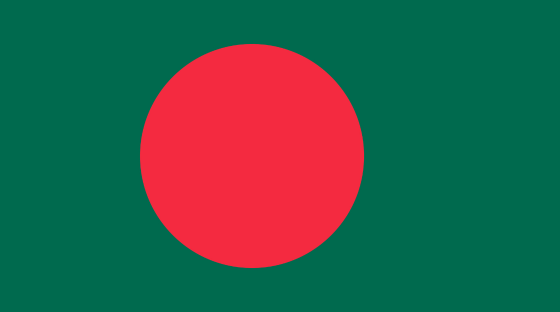Bangladesh

Overview
Located at the tip of the Bay of Bengal, Bangladesh has been among the fastest-growing economies in the world over the past decade, with an impressive track record in poverty reduction and development. While not without challenges, it is emerging as an outsourcing destination with aspirations to become a serious contender in the global software development arena. The second-largest source of IT freelancers in South Asia, it’s considered a promising technological hub, underpinned by a growing number of startups and an increasing focus on digital innovation.
English is widely used among business professionals and in the public sector, a legacy of British colonial rule in the 18th century. The borders of modern Bangladesh were established with the separation of Bengal between India and Pakistan in 1947. An independent nation since 1971, it’s now snapping at China’s heels as the second-largest apparel exporter in the world. In 2023, its global market share was almost 8% and valued at $47.39 billion.
The Accelerance Global Network is the most curated list of high-quality global teams ever assembled.
800
Developers
Total number of developers in our certified partner network by country
4
Certified Partners
Total number of certified partners in our global network by country.
19hrs
Time Travel (From NY)
Average flight time from NY to the major cities in the country.
102
Partner Innovation capability
The score reflects investment in STEM progrms and IT funding by country.
59
Partner Skill Level
Level of workforce skills and quality of education, including factors such as digital literacy, interpersonal skills, etc.
103
Partner Global Competitiveness
National productivity based on 12 core pillars, including government policy, infrastructure, economic stability, etc.
High
Software Outsourcing Readiness
Overall rating, based on the maturity of the tech sector, socio-political conditions, and on-the-ground research by Accelerance.
.png?width=600&height=375&name=Untitled%20design%20(29).png)
Talent Pool & Education
Bangladesh’s tech market is expected to continue to expand over the next five years, reflecting a growing emphasis on digital technology, cybersecurity, artificial intelligence, robotics, and e-healthcare. One of South Asia’s most promising tech hubs, its emerging IT sector has created 300,000 new jobs, contributing 1.3% to GDP. More than 6,500 startups now operate across the country, and Bangladesh Association of Software and Information Services president Russel T. Ahmned believes the industry’s value could grow to $30 billion by 2031.
According to the World Bank, 64% of the country’s population is under 30, providing a ready talent pool for both startups and established companies. The government is actively harnessing the country’s untapped youth potential by linking the IT industry to the education sector. The Bangladesh Hi-Tech Park Authority is overseeing the development of 28 high-tech parks across the country, with four already completed. These parks provide free space to local startup companies and specialized incubators where young people will be trained in advanced technologies such as robotics, artificial intelligence, and extended reality.
In June 2023, Huawei South Asia launched a "Women In Tech" project in collaboration with UNESCO that aims to develop talent among Bangladeshi women, foster knowledge sharing, and promote gender equality in science and technology.
Language
Bengali (or Bangla) is the official language, but English is used extensively in government and in the business sector – a legacy of British colonization. Among the middle and upper class, many can read and write English fluently. Professionals with strong language skills have greater employment opportunities with private companies in Bangladesh and command significantly higher wages, so it’s no surprise that schools where most subjects are taught in English are widely attended.

Economic Outlook
Bangladesh has recorded one of the fastest growth rates in the world over the past few years with a stable economic performance that has helped to reduce poverty and social inequalities. However, the economy has slowed sharply as a result of the Russia-Ukraine war pushing up the price of fuel and food imports, forcing Bangladesh to turn to the International Monetary Fund for a $4.7 billion bailout. Inflation averaged 9.5% in 2023, the highest in a decade.
Prime Minister Sheikh Hasina has identified taming inflation and reviving the economy as her first priorities. The election result is expected to ensure political stability and policy continuity. Less severe power rationing and the resumption of infrastructure projects that had been stalled will support economic activity, according to an Economist Intelligence Unit report. While the impact of monetary tightening and cooling export growth will be a drag on economic growth, GDP is forecast to lift slightly to 6.2% in 2023/24.
Bangladesh is still on track to graduate from the UN’s Least Developed Countries (LDC) list in 2026. Due to its flat, low-lying topography and high population, it is one of the most vulnerable countries in the world to climate change, with extreme weather events estimated to have caused a 1.8% loss of GDP over the past few decades. Measures have been taken to promote green financing and to seek grants from the international community, notably via the Green Climate Fund.
Political Conditions
Bangladesh Prime Minister Sheikh Hasina swept to a fourth straight term in power in the general election held in January 2024, with her ruling Awami League party winning almost three-quarters of the seats. However the main opposition Bangladesh Nationalist Party boycotted the election and turnout was low, falling to almost half the 80% participation rate recorded in 2018.
A spokesman for the US State Department expressed concern at reports of vote irregularities on election day and the arrest of thousands of political opposition members. "The United States shares the view with other observers that these elections were not free or fair and we regret that not all parties participated."
The world’s longest serving female head of government, Hasina has been in power for the past 15 years. In that time, she has overseen one of the fastest-growing economies in the world and lifted millions out of poverty as part of her development agenda. Credited with turning around the country’s massive garments industry, she has also won international praise for sheltering Rohingya Muslims fleeing persecution in neighboring Myanmar.
However her achievements are often overshadowed by a turn to authoritarianism, with critics accusing Hasina of human rights violations, and suppression of free speech and dissent. The government carried out a sweeping crackdown In the run-up to the election and rolling street protests often ended in violence.
Learn more about our customer stories.
Looking for a customer story in a specific technology or industry? Discover compelling customer narratives within a specific technology or industry that resonate with your unique software development needs.


.png?width=300&name=Copy%20of%20WEBSITE%20Stop%20Chasing%20Low%20Hourly%20Rates%20Unlock%20the%20True%20Value%20of%20Offshore%20Development%20(450%20x%20253%20px).png)



